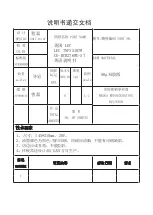
15
REFRIGERATOR CARE & CLEANING
TROUBLESHOOTING GUIDE
UNDERSTANDING SOUNDS YOU MAY HEAR
Your new refrigerator might produce certain noises that
your previous refrigerator did not. It is normal if you worry.
Most of the new sounds you will be hearing are actually
normal and expected. Hard surfaces like walls or floor
can increase sounds and make them sound louder than
they really are. The following list has a description of such
sounds along with their causes.
•
The defrost timer will click when the automatic defrost
cycle begins and ends. The refrigerator control,
depending on the model) will also click when cycling
on and off.
•
Rattling noises may come from the flow of refrigerant,
the water line or items stored on top of the refrigerator.
•
Your refrigerator is designed to run more efficiently
to keep your food items at the desired temperature.
The high efficiency compressor may cause your new
refrigerator to run longer than your old one and you
may hear a pulsating or high-pitched sound.
•
You may hear the evaporator fan motor circulating the
air through the refrigerator and freezer compartments.
•
As each cycle ends, you may hear a gurgling sound
due to the refrigerant flowing in your refrigerator.
•
Contraction and expansion of the inside walls may
cause a popping noise.
•
Water dripping on the defrost heater during a defrost
cycle may cause a sizzling sound.
•
You may hear air being forced over the condenser by
the condenser fan.
•
You may hear water running into the drain pan during
the defrost cycle.
•
Due to refrigerator’s low energy consumption design,
the fans will remain off by the door switch activates the
inner compartment light.
Problem
Possible Causes
Solutions
Refrigerator is not
cooling
•
The power supply cord is unplugged.
•
A household fuse has blown or a
circuit breaker has tripped.
•
The refrigerator is in the defrost
cycle.
•
Firmly plug the cord into a live outlet with
proper voltage (see
Requirements for Ground
Connection
).
•
Replace the fuse or reset the circuit breaker. If the
problem persists, contact an electrician.
•
Wait about 30 minutes for defrost cycle to end.
Strange sounds
or Snoozing
(Vibrations)
•
The refrigerator is not correctly
positioned.
•
You need to adjust the leveling screws due the
floor is unleveled or weak. Read the
Installation
section.
Lights do not work
•
The power supply cord is unplugged.
•
The LED light does not work.
•
Plug the refrigerator in a right voltage plug.
•
Read the section
LED Light Replacement.
Compressor seems
to run too much
•
The refrigerator that was replaced
was an older model.
•
The room temperature is hotter
than usual.
•
Modern refrigerators require more operating
time but use less energy due to more efficient
technology.
•
The compressor will run longer under warm
conditions. At normal room temperatures 70 °F
(21 °C) expect your compressor to run about 40%
to 80% of the time. Under warmer conditions,
expect it to run even more often. The refrigerator
should not be operated above 110 °F (43 °C).
Summary of Contents for LTN16385PL
Page 3: ......
















































